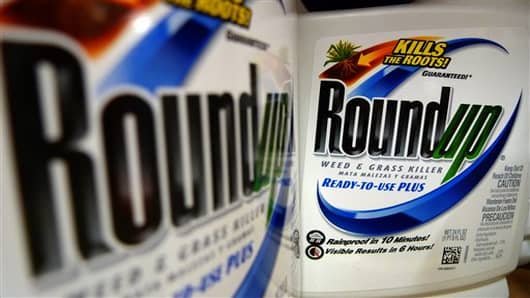Farmers who buy the seeds must generally sign a contract promising not to save seeds from the resulting crop, which means they must buy new seeds every year.
But the Indiana farmer, Vernon Hugh Bowman, who had signed such contracts for his main crop, thought he had discovered a loophole for a second, riskier crop later in the growing season: he would buy from a grain elevator filled with a mix of seeds in the reasonable hope that many of them contained the Roundup Ready gene.
Such seeds are typically sold for animal feed, food processing or industrial use. Mr. Bowman planted them and sprayed them with Roundup. Many of the plants survived, and he saved seeds for further plantings.
Mr. Bowman argued that a doctrine called patent exhaustion allowed him to do what he liked with products he had obtained legally. But lower courts ruled that Mr. Bowman's conduct amounted to patent infringement.
A federal judge in Indiana ordered Mr. Bowman to pay Monsanto more than $84,000. The United States Court of Appeals for the Federal Circuit, which specializes in patent cases, upheld that decision, saying that by planting the seeds Mr. Bowman had infringed Monsanto's patents.
At Tuesday's argument, Mr. Bowman's lawyer received a markedly more hostile reception than Mr. Waxman. He was peppered with skeptical questions from almost every justice.
"Why in the world," Chief Justice John G. Roberts Jr. asked, "would anybody spend any money to try to improve the seed if as soon as they sold the first one anybody could grow more and have as many of those seeds as they want?"
The lawyer, Mark P. Walters, said that companies could rely on contracts rather than patent law to protect their inventions, an answer that did not seem to satisfy several of the justices.
"It seems to me that that answer is peculiarly insufficient in this kind of a case," Justice Elena Kagan said, "because all that has to happen is that one seed escapes the web of these contracts, and that seed, because it can self-replicate in the way that it can, essentially makes all the contracts worthless."
Mr. Walters said that it was Monsanto's approach that was extreme.
"The reach of Monsanto's theory," Mr. Walters said, "is that once that seed is sold, even though title has passed to the farmer, and the farmer assumes all risks associated with farming, that they can still control the ownership of that seed, control how that seed is used."
Justice Stephen G. Breyer said that there were lots of things Mr. Bowman could do with the seeds he had bought from the grain elevator.
"You can feed it to animals, you can feed it to your family, make tofu turkeys," he said.
"But I'll give you two that you can't do," he went on. "One, you can't pick up those seeds that you've just bought and throw them in a child's face. You can't do that because there's a law that says you can't do it. Now, there's another law that says you cannot make copies of a patented invention."
Justice Sonia Sotomayor said the doctrine of patent exhaustion did not help Mr. Bowman.
"The exhaustion doctrine permits you to use the good that you buy," she said. "It never permits you to make another item from that item you bought."
Mr. Walters, responding to a series of questions in this vein, said that "we disagree that the activity of basic farming could be considered making the invention."
Mr. Waxman countered that the upshot of Mr. Walters's argument was that Monsanto's patents would be rendered worthless.
"Having committed hundreds of millions of dollars in 13 years to develop this technology," he said, the sale by Monsanto of a single seed "would have exhausted its rights in perpetuity."
The federal government largely supported Monsanto. "The exhaustion doctrine has always been limited to the particular article that was sold, and we are talking about a different article here," said a lawyer for the government, Melissa Arbus Sherry. "And it's never extended to the making of a new article."
Justice Breyer seemed in a particularly playful mood on Tuesday. At one point he alluded to a notorious line from a 1927 opinion by Justice Oliver Wendell Holmes Jr., in which Holmes sought to justify the forced sterilization of a woman with mental disabilities. ("Three generations of imbeciles are enough," Justice Holmes wrote.)
"There are three generations of seeds," Justice Breyer said, to knowing chuckles. "Maybe three generations of seeds is enough."
— Written by The New York Times' Adam Liptak




